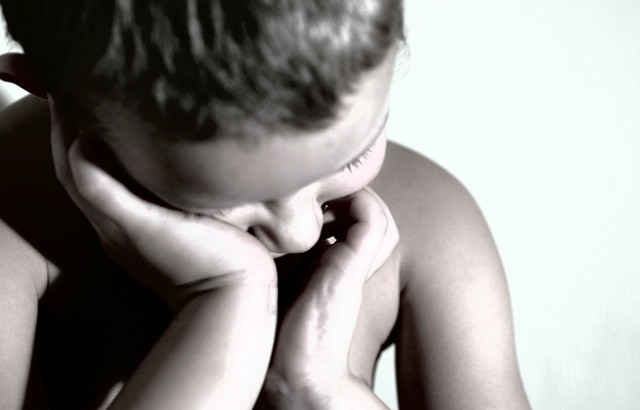On our way back from the airport, we decided to stop at a restaurant to enjoy some family time.
The restaurant was jam packed with people, as it was a weekend. Mostly families from the colonies nearby were there with their kids. We led my brother to the play area and settled down to wait for the flight to arrive.
My brother, being a special child and possessing a very playful nature, was delighted to see the mob of children of all ages, playing and laughing and he ran over to join them. About ten minutes later I noticed the play area was considerably emptier and more than a few parents were crowded outside the play area, in a heated argument with the manager of the restaurant. I watched the proceedings, clearly confused I thought maybe a child had gotten hurt and the parents were blaming the management for it. My confusion increased when the manager broke away from the group and walked over to our table,
“Excuse me miss”, he addressed me
“We would appreciate it if you asked your brother to vacate the play area”
I couldn’t believe what I was hearing.
When I asked for a reason, he simply stated,
“The parents of the children are concerned that your brother might harm their children, or that his condition might be contagious”
I was completely taken aback at this last statement and bluntly told the manager that we were customers there and it was as much our right as any of the other children’s, to use the play area.
The manager looked very uncomfortable and said,
“I understand that but the parents wish that your brother leave the play area or their children can’t play”
When I looked over at the close-minded individuals who were asking of something so ridiculous, I saw that their children were very curious about my brother and genuinely wanted to go play with him, but it was the parents who were holding them back and sharply telling them that,
“Woh bacha sahi naheen hai”
(That child is not right)
“Woh maaray ga, usskay kareeb naheen jana”
(He will hit you, don’t go near him)
Listening to all this and watching the many accusatory glances being thrown at my innocent brother, along with lips curled in distaste, I wondered what kind of ignorant people lived in our country.
Sadly, anything or anyone slightly different from the general population is treated like an outcast in our society, be it a special child, a disabled individual, or even a foreigner.
Having done my Bachelors in Special Education, I thought I was well aware of the kind of treatment such children receive by the hands of the general public, but going through something like this on such a personal level, it left a bad taste in my mouth and general feeling of pity and disgust for the people who know not of the purity and innocence of the special child, but see only that he looks and acts different from normal people.
The children brought up in such families; grow up believing the disillusions their parents hammer into their brains about special children. Mentally retarded individuals are nothing more than mere children, frozen forever in a state where everything they see and every person they encounter is received with the bias-less affection of an infant. Special children are the purest of souls amongst us and I know personally that God listens to them, even if they aren’t in the right state to pray.
I have witnessed women denying they have a special child, preferring to hide them away at home and not take them out, too embarrassed to let the world see they have an imperfect child. I personally know people who grew up being scared of mentally retarded and handicapped children, thinking they will hurt them and even as grown adults, show displeasure in having to interact with such people.
When I was a young girl, one of my good friends was a girl in the neighbourhood who was deaf and couldn’t speak. She was one of the most talented painters I had ever seen and also one of the friendliest people I have come across. But every time we would go to some birthday in the neighbourhood, or even go out to play, in an attempt to make friends, the other children would run around her and mock her, imitate her and the gestures she would make in a desperate attempt to converse with them.
What disturbed me more than the children’s behaviour was the fact that the parents were doing nothing to stop them from mocking that girl’s handicap.
Children are at an impressionable age where they look up to their elders to know what ethics are, and if taught the wrong ethics, they grow up to be ignorant and narrow minded. It is sad to see that in a developing country like Pakistan, where special education and understanding children with special needs is the new field every educational institute is exploring and supporting, there are people who are shunning the notion of showing any compassion to such people.
It is heart-warming to see places such as KFC, giving jobs to people with special needs, and NGOs such as the Network of Organisations Working for People with Disabilities Pakistan (NOWPDP) working day and night to help the handicapped people find regular jobs and earn wages like any normal person.
There are more blind students studying in the University of Karachi, than any other institute today, but is that enough?
People, who have been blessed by Allah, should show their gratitude by being good and kind to the ones less fortunate and less perfect than them. I am witness to the fact that if you are good to a special child and have made him happy, everything you do will bring you peace and satisfaction. Simply helping them obtain a job is not enough, they need to be engaged by their surroundings, accepted and most of all loved.
Here are a few tips for the readers, a kind of stepping stone on how to act around and accept those with special needs, in our society.
Try and understand them
Children and people with special needs are no different than you and I, and it is standard that they too want to socialise, in whatever way is easy for them, be it sign language or expressions and gestures. If you meet someone with a disability, try to put yourself in their shoes and understand what they are going through.
Know that they didn’t want to be born this way; hence one has no right to make fun of them. Indulge in their ways to communicate and give them company if nothing else.
Show them respect and treat them like normal people
Sometimes, people with special needs appreciate you not letting their disability have an effect on your relationship with them. Treat them with respect, like you would any normal person.
Appreciate and encourage them
Being born with a disability, one does not come across a lot of encouragement especially in a country where people find reasons to point and laugh at you. Appreciate their efforts in their daily life and encourage them to do more. Never pinpoint that they are unable to do something because of their disability, it is most likely to have a very severe negative effective.
Understand that they are very sensitive
People with special needs, especially mentally handicapped children are very sensitive to a person’s moods. They know when a person is being genuinely affectionate towards them, and when a person is uncomfortable. If you have difficulty accepting their disability, don’t force yourself to spend time with them, it will only make them feel worse.
People need to understand and realise that people with handicaps are just like regular people, born different, and instead of being ridiculed, should be loved and respected. They also need to realise that treating such people with disgust and shunning them aside, only reflects poorly on their own character. As Johann Wolfgang von Goethe rightly said,
“You can easily judge the character of a man by how he treats those who can do nothing for him”
It is as much their country, as ours; they have as much a right to go wherever they please, as ours, and they certainly do not deserve to be ridiculed and be subjected to false and sometimes very offending accusations, just because they were born in a way different than us.
Follow Fatima on Twitter @fatimakm
Join us on Facebook and Twitter for blog updates and more!



COMMENTS
Comments are moderated and generally will be posted if they are on-topic and not abusive.
For more information, please see our Comments FAQ